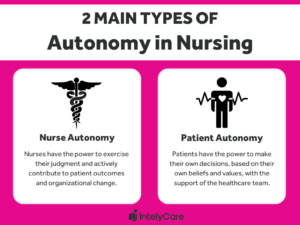The Critical Importance of Autonomy in Nursing

As a nurse, you navigate a complicated interplay of responsibilities — you’re an educator, a listener, a skilled clinician, and a teammate. Autonomy allows you to fulfill each of these roles, and it’s part of what makes you a professional nurse. Examples of autonomy in nursing might be as small as advising a patient using your clinical expertise or as big as shaping organizational policies.
Increasing nurse autonomy has been shown to measurably improve several aspects of nursing, such as:
- Job satisfaction
- Nurse retention
- Respect, status, and recognition
- Patient outcomes
Additionally, the American Nurses Credentialing Center uses measures of nurse autonomy as part of their Magnet Distinction, which recognizes top healthcare organizations for nursing excellence. Autonomy is essential for a healthy environment for clinicians and patients. But what does autonomous nursing mean for your practice?

What Is Autonomy in Nursing?
Autonomy means having the freedom to make your own decisions. Without it, nurses are reduced to task-performers, and job satisfaction and patient outcomes suffer.
There are two main types of autonomy in practice — the autonomy that nurses have to make decisions within their scope of practice, and the autonomy that patients have to make decisions for their health. An autonomous nurse has the ability to practice to the full extent of their license, and an autonomous patient is empowered to do what they believe is best for them.
Nurse Autonomy
In nursing practice, autonomy means that nurses have the power to exercise their judgment and actively contribute to patient outcomes and organizational change. During the mid-19th century, when Florence Nightingale was espousing the need for nurses to become more involved in patient care, nurses were secondary to physicians. An autonomous nurse is not just a helper who fulfills orders, but a skilled clinician who brings unique expertise to patient care and is valued within organizational structures.
Nurses use their autonomy frequently. When you adjust a patient’s oxygen flow, or escalate a problem up the chain of command, you’re using this key professional skill. See these other examples of nurse autonomy in practice:
- A nurse enters a room and finds the patient unresponsive. Using BLS protocols, the nurse calls for help and initiates chest compressions.
- A nurse is preparing a patient for wound care, and the patient has orders for a scheduled acetaminophen and an as-needed opioid. To ensure the patient’s pain is addressed before wound care, the nurse administers both.
- A nurse joins their hospital’s shared governance board to advocate for improved staffing on night shift.
Patient Autonomy
For patients, being autonomous means being able to make decisions for oneself, with the support of the healthcare team. Nurses support patient autonomy by helping them make decisions to the best of their ability. Patients have the right to make decisions based on their own beliefs and values.
Promoting patient autonomy is essential to being an exemplary clinician. Here are some ways that nurses promote patient autonomy:
- A nurse educates a patient about a procedure and ensures their full understanding before helping them sign an informed consent form.
- An oncology patient states to their nurse that they don’t want to continue treatment, so the nurse sits with them and gives them information about hospice options.
- While supporting a birthing patient, a nurse gives positioning options that align with the patient’s birth plan.
5 Strategies to Promote Nurse Autonomy
You probably have opportunities to practice autonomous nursing every shift. Try these suggestions to integrate it more into your practice:
1. Know Your Scope of Practice
It’s hard to work within your full scope when you’re not sure what that is. Your scope of practice can vary depending on your facility, your license, and your state, so familiarize yourself with the policies of your specific role. Recognizing the boundaries of your practice ensures that you provide safe and effective care within your professional scope.
2. Hone Your Critical Thinking Skills
Critical thinking is essential to the autonomy of nurses. It refers to an individual’s ability to analyze complex ethical issues, consider various perspectives, challenge assumptions, seek additional information when needed, and integrate clinical reasoning into their everyday practice. Learn more about ways to improve your critical thinking.
3. Collaborate With the Healthcare Team
Autonomy does not imply isolation. Collaborate with other healthcare professionals to enhance patient outcomes. Effective teamwork promotes shared decision-making and allows each team member to contribute their expertise. Communicate openly, share insights, and participate in multidisciplinary discussions to improve patient care.
4. Advocate for Patient-Centered Care
Actively involve your patients in their care decisions to ensure honorable practice. Encourage open communication, listen to patient preferences, and involve them in shared decision-making. Respect and support patients’ autonomy by providing information, fostering informed consent, and considering their values and beliefs in care planning.
5. Get Involved
Nurse advocates at the organizational level have the power to influence policy and help make medicine better. If you work at a Magnet facility, ask your manager or clinical leader about how to get involved in shared governance. If your facility is not Magnet-designated, you can still get involved by joining a professional organization in your specialty.
Looking for More Autonomy in Your Career?
Now that you know about the types of autonomy in nursing, you’ll probably notice the ways they occur during your next shift. IntelyCare’s job notifications give you the power to choose your next career move, giving you access to the latest nursing jobs right in your inbox.
